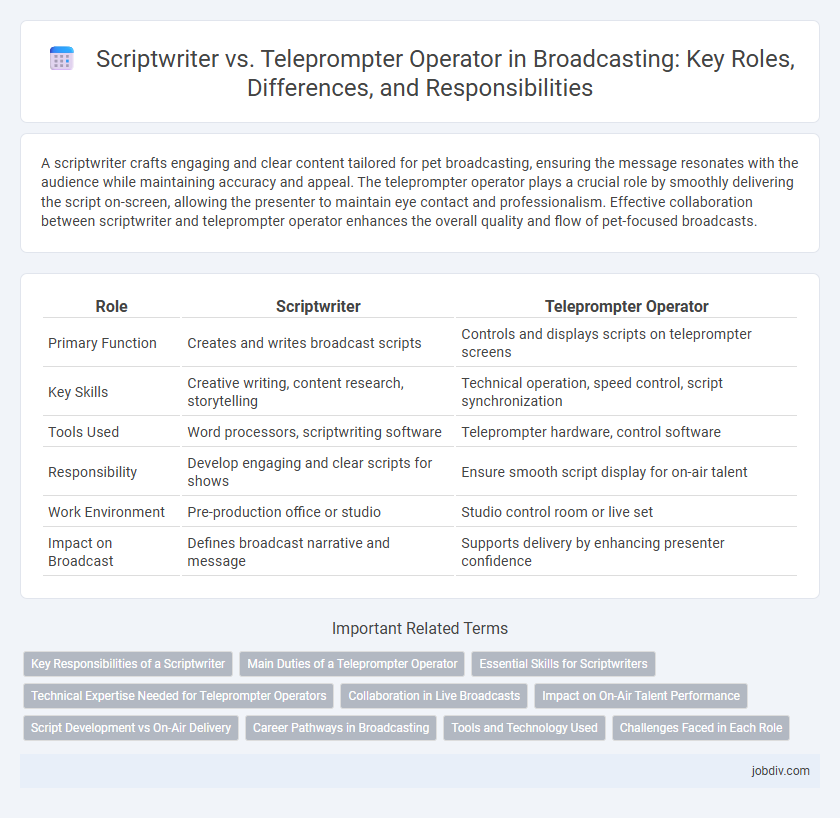A scriptwriter crafts engaging and clear content tailored for pet broadcasting, ensuring the message resonates with the audience while maintaining accuracy and appeal. The teleprompter operator plays a crucial role by smoothly delivering the script on-screen, allowing the presenter to maintain eye contact and professionalism. Effective collaboration between scriptwriter and teleprompter operator enhances the overall quality and flow of pet-focused broadcasts.
Table of Comparison
| Role | Scriptwriter | Teleprompter Operator |
|---|---|---|
| Primary Function | Creates and writes broadcast scripts | Controls and displays scripts on teleprompter screens |
| Key Skills | Creative writing, content research, storytelling | Technical operation, speed control, script synchronization |
| Tools Used | Word processors, scriptwriting software | Teleprompter hardware, control software |
| Responsibility | Develop engaging and clear scripts for shows | Ensure smooth script display for on-air talent |
| Work Environment | Pre-production office or studio | Studio control room or live set |
| Impact on Broadcast | Defines broadcast narrative and message | Supports delivery by enhancing presenter confidence |
Key Responsibilities of a Scriptwriter
A scriptwriter develops compelling scripts tailored to the target audience, ensuring a clear, engaging narrative that aligns with the broadcast's objectives. They conduct thorough research, write dialogue, and structure content to maintain viewer interest while meeting time constraints. Scriptwriters collaborate closely with producers and directors to adapt scripts for live or recorded formats, enhancing overall program quality.
Main Duties of a Teleprompter Operator
A Teleprompter Operator is responsible for managing the scrolling text that presenters read during live broadcasts, ensuring smooth and timely delivery. They synchronize the script with the broadcast pace, adjusting speed and handling real-time changes to maintain seamless flow. Precision and quick response are critical for coordinating with anchors and production teams to avoid on-air disruptions.
Essential Skills for Scriptwriters
Scriptwriters in broadcasting require exceptional storytelling abilities, strong command of language, and the skill to craft engaging, concise, and clear narratives tailored for the target audience. Mastery of script formatting, understanding visual and auditory cues, and collaboration with directors and producers are essential for seamless production. Unlike teleprompter operators who focus on precise reading and timing, scriptwriters prioritize creativity, content coherence, and pacing to ensure compelling broadcasts.
Technical Expertise Needed for Teleprompter Operators
Teleprompter operators require advanced technical expertise in managing teleprompter software and hardware, ensuring smooth and precise scrolling of scripts during live broadcasts. Proficiency in synchronizing script speed with the speaker's delivery and troubleshooting equipment malfunctions is essential for maintaining broadcast quality. Unlike scriptwriters, teleprompter operators must possess specialized knowledge of teleprompting technology and real-time operational skills to support on-air talent effectively.
Collaboration in Live Broadcasts
Scriptwriters and teleprompter operators collaborate closely during live broadcasts to ensure seamless delivery of content. Scriptwriters craft clear, concise scripts that teleprompter operators input and adjust in real-time, facilitating smooth on-air presentation. Effective communication between both roles minimizes errors and enhances the overall viewer experience.
Impact on On-Air Talent Performance
Scriptwriters craft compelling narratives that provide clear, concise dialogue, directly enhancing the on-air talent's confidence and delivery. Teleprompter operators ensure smooth, error-free text flow, reducing the likelihood of on-air mistakes and improving the talent's natural engagement with the audience. Effective collaboration between scriptwriters and teleprompter operators results in seamless broadcasts and elevated on-air talent performance.
Script Development vs On-Air Delivery
Scriptwriters craft compelling narratives and structure content to engage audiences, focusing on developing clear messages and pacing for smooth broadcasts. Teleprompter operators ensure the flawless on-air delivery by accurately displaying the script in real time, adapting to speakers' pacing and maintaining synchronization. Effective collaboration between script development and teleprompter management enhances broadcast clarity and viewer engagement.
Career Pathways in Broadcasting
A scriptwriter in broadcasting develops engaging content and crafts narratives that guide the show's flow, requiring strong writing and storytelling skills. A teleprompter operator ensures smooth on-air delivery by managing the scrolling of scripts in real-time, demanding technical precision and quick adaptability. Both career paths offer progression opportunities, with scriptwriters advancing to roles like content directors or producers, while teleprompter operators can move into technical directing or broadcast engineering positions.
Tools and Technology Used
Scriptwriters rely on advanced writing software such as Final Draft or Celtx to draft and format scripts efficiently, enabling seamless collaboration and revision workflows. Teleprompter operators utilize specialized hardware and software systems like Autocue or PrompterPal that synchronize script display with live broadcast timing, ensuring smooth reading and on-air presentation. Both roles integrate digital tools that enhance accuracy and coordination in live television production environments.
Challenges Faced in Each Role
Scriptwriters encounter challenges such as crafting engaging, error-free dialogue under tight deadlines while ensuring the content aligns with the broadcast's tone and target audience. Teleprompter operators face the difficulty of synchronizing the scrolling speed precisely with the speaker's delivery, requiring sharp concentration to adapt to unexpected changes in real-time. Both roles demand a high level of accuracy and coordination to maintain seamless live or recorded broadcasts.
Scriptwriter vs Teleprompter Operator Infographic

 jobdiv.com
jobdiv.com